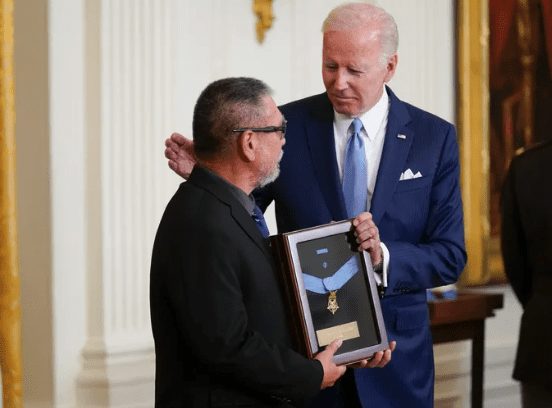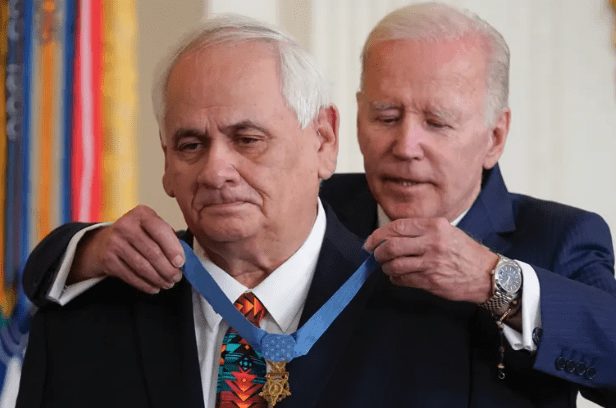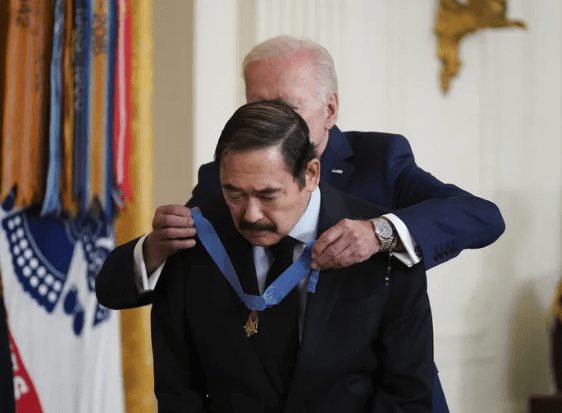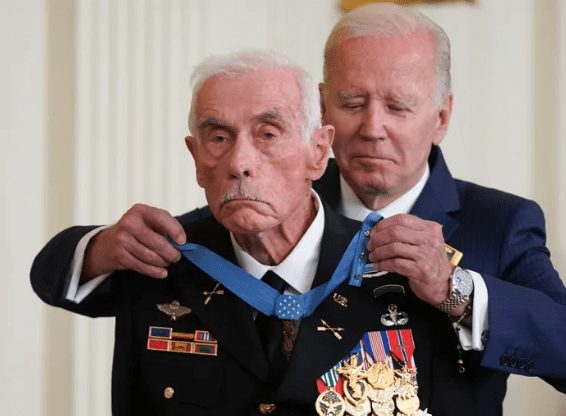President Joe Biden awarded four U.S. Army soldiers who served in the Vietnam War the Medal of Honor on Tuesday, upgrading previous honors they had received.
The four recipients of the most prestigious decoration in the U.S. military, all of whom “went far above and beyond the call of duty,” are: late Staff Sergeant Edward N. Kaneshiro, Specialist Five Dwight W. Birdwell, Specialist Five Dennis M. Fujii, and retired Major John J. Duffy.
“They stood in the way of danger, risked everything … to defend our nation and our values,” Biden said during the ceremony at the White House. “However, not every service member has received the full recognition they deserve. Today we’re setting the record straight. We’re upgrading the awards of four soldiers who performed acts of incredible heroism during the Vietnam conflict.”
Even though more than 50 years have passed since the end of the Vietnam War, “time has not diminished their astonishing bravery, their selflessness in putting the lives of others ahead of their own, and the gratitude that we as a nation owe them,” the president added.
Kaneshiro was posthumously awarded the Medal of Honor for acts of gallantry while serving near Phu Huu 2 in Vietnam on December 1, 1966.

President Joe Biden presents the Medal of Honor to Staff Sgt. Edward Kaneshiro’s son, John Kaneshiro, for his father’s actions on December 1, 1966.
Kaneshiro and members of his platoon were attacked by North Vietnamese when they entered the village of Phu Huu 2 on a search and destroy mission.
According to the White House, “Kaneshiro destroyed one enemy group with rifle fire and two others with grenades, which enabled the orderly extrication and reorganization of the platoon and ultimately led to a successful withdrawal from the village.”
He served in Vietnam from July 18, 1966, until he was killed in action on March 6, 1967.
“Your family sacrificed so much for our country,” Biden told Kaneshiro’s family. “I know that no award can ever make up for the loss of your father and not having him there as you grew up. But I hope today you take some pride and comfort in knowing his valor is finally receiving the full recognition it has always deserved.”
Birdwell, a former Cherokee Nation Supreme Court justice, received the Medal of Honor for acts of heroism while serving in Vietnam on January 31, 1968.

President Joe Biden awards the Medal of Honor to Spc. Dwight Birdwell for his actions on January 31, 1968.
Birdwell moved the tank commander to safety and fired the tank’s weapons at enemy forces, according to the White House. After exhausting the tank weapons, Birdwell dismounted and continued fighting until receiving enemy fire to his face and torso.
He refused evacuation and led a small group to disrupt the enemy assault until reinforcements arrived, the White House said. Birdwell then helped evacuate the wounded until he was ordered to seek attention for his own wounds.
He was honorably discharged on December 29, 1968, and today practices law in Oklahoma City.
“I did the job that I was trained for. I felt like I had to do this. It was a matter of duty. And I did my duty as best I could,” Birdwell said. “I’ve wondered a thousand times why I survived and some of the others didn’t, but I’ve thought when I go up for judgment, if I have the courage, I’ll ask God that question.”
Fujii received the Medal of Honor for his actions while serving as the crew chief aboard a helicopter ambulance during rescue operations in Laos and Vietnam from February 18–22, 1971.

President Joe Biden awards the Medal of Honor to Spc. Dennis Fujii for his actions on February 18-22, 1971.
Fujii’s helicopter took on enemy fire during a mission to evacuate seriously wounded Vietnamese military personnel and was forced to crash land, according to the White House.
Despite being injured, Fujii waved off a rescue from another helicopter and was the only American to stay behind on the battlefield.
Fujii administered first aid to wounded allies and repeatedly exposed himself to enemy fire to call in U.S. helicopter gunships to repel enemy attacks. For more than 17 hours, he left the security of his entrenchment to get a better view of enemy troop positions and direct air strikes against them.
Eventually, an American helicopter airlifted Fujii from the area. Upon completing his tour, he joined the Army Reserve and currently resides in Hawaii.
Duffy received the Medal of Honor for his acts while serving as the senior adviser to the 11th Airborne Battalion, 2nd Brigade, Airborne Division, Army of the Republic of Vietnam, from April 14-15, 1972.

President Joe Biden awards the Medal of Honor to retired Maj. John Duffy for his actions on April 14-15, 1972.
Two days earlier, an enemy ambush left the commander of the 11th Airborne Battalion dead, the battalion command post destroyed, and Duffy wounded, but he refused to be evacuated.
Duffy led evacuees, many seriously wounded, to an evacuation area “while in continual pursuit by the enemy,” according to the White House. He directed airstrikes on enemy positions and marked a landing zone for the helicopters.
The White House said that only after ensuring all evacuees were aboard did Duffy board the helicopter as well.
President Biden also described how as their airship was preparing to depart, one of Duffy’s Vietnamese allies was shot in the foot, “causing him to fall backwards out of the helicopter.”
“Maj. Duffy caught him and dragged him back in on board, saving one more life along the way,” he continued.
Duffy, 84, served three tours in Vietnam and various Special Forces assignments until he retired from the Army on May 31, 1977. He racked up 64 awards and decorations during his service, including 29 for valor, four Bronze Stars, eight Purple Hearts, and seven Air Medals.
“You’re honor-bound to do your duty, and it doesn’t matter the risk or the danger. You’re there to perform. And as long as you do that, you’re in control,” Duffy said before receiving his Medal of Honor.


